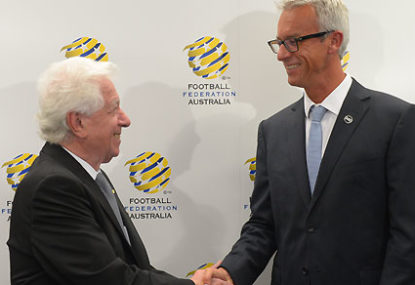Young excellence, promotion battles, and a happy farewell: The Australian team of the week from players around the globe
Even though St.Pauli ultimately lost a high-scoring affair, Jackson Irvine was a standout, as well as scoring a late goal.

What lessons can we take from the Holger Osieck era when appointing our next coach?
Part of the last selection criteria was to have a demonstrated ability to develop young footballers in to international players, and to develop our own leaders of the future.
Osieck had an impressive resume that clearly met these conditions, among others, yet what performance criteria and goals were ever put in place to measure his success on these issues?
Is results-based goal setting even an acceptable method of assessing a national team coach?
Some scientific research suggests that goal setting stifles creative thinking, development, and risk taking. In fact, goal setting may actually lead to worse performance as the focus becomes the goal rather than the task itself.
Let me give you an example.
Suppose we have two teams of mechanics asked to build a vehicle from scratch. There is a million dollar prize for the first team to complete ten laps of a course. One team starts trying to build a race car.
The other puts some wheels on a chassis along with a motor and a seat, and finishes their 10 laps before the other team is even close to completing a design.
Too simple? Not relevant?
Let’s transfer that to the national football team.
Here is a selection of players.
We want a good team, and we will measure that and give you a million-dollar bonus if you qualify for the World Cup.
When Guus Hiddink was given this job, he had to defeat Uruguay to achieve this goal.
When Pim Verbeek was given this job, he had to defeat Bahrain, Qatar, and Uzbekistan.
When Osieck was given this job, he had to defeat Jordan, Oman and Iraq.
Is it any wonder that Hiddink developed a stronger team than either of the other two? His task was that much harder.
It was clear in both of the later cases, that achieving World Cup qualification was stifling team development.
Both Verbeek and Osieck took the view it was easier and safer to stick with the tried and tested players, because it was known that they were capable of achieving the measured goal.
Is it a failing on the part of Verbeek or Osieck that their success was measured by a lesser task? Of course not.
It is the job of FFA management to clearly articulate all desired outcomes and monitor the success or failure of the coach in relation to that.
And just what are the goals of the FFA?
Is having a good team the number one priority, or is qualification for the World Cup, and the attendant monetary and publicity windfall, their top consideration?
It would be nice for both to have equal value, but it is quite clear that the second definitely holds the most sway at management level.
This is not to say that point of view is wrong, just that the objectives of the FFA are not necessarily those of the average football fan.
The problem that has become apparent over the past month, is that the quality of the team is such that it is impacting on the public perception of the sport, and putting potential future monetary and publicity gains at risk.
This is why Osieck was shown the door now and not long ago when the footballing fraternity started voicing major concerns about where he was taking the team.
What can be taken away from all this then?
It can not be assumed that appointing a coach and giving him results based criteria will result in the development of a better team.
In fact it is entirely possible that it will have the opposite effect.
The FFA needs to spend at least as much time and effort examining its goals and priorities for the national team as it does deciding on a new coach.
No matter who they appoint, the national team will not achieve its full potential unless the FFA and national coach work hand in hand towards building a better team, regardless of any on-field results.
It is not just up to the coach.